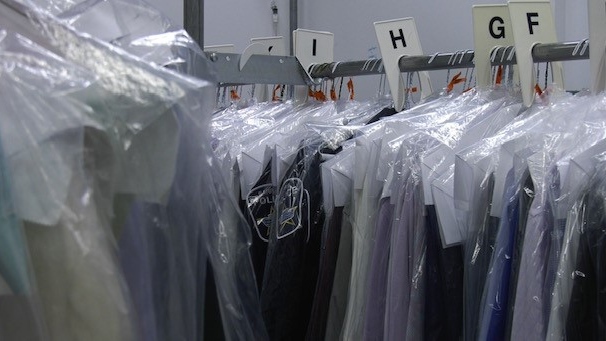Dry cleaning industry calling on government help as future remains uncertain

The dry cleaning industry is calling on the government for help as its future remains uncertain.
On Thursday, the Canadian Fabricare Association (CFA) said over 30 per cent of cleaners had vanished.
"The dry cleaning industry was designated as an essential service and received no financial help from either the provincial or federal government," wrote the CFA in a statement.
The Association is now calling on politicians to consider a tax credit to customers who use a commercial cleaner or launderer to help stimulate the economy.
"We're looking for that incentive from the government to help them out to help the cleaners out," said David Alonzi, a CFA board member and president of GreenClean.
Kim Sekleski-Polley has owned Cotty's Cleaners in Barrie for two decades.
Over that time, she has seen industry shifts but never to the extent during the pandemic.
"Business today is very different than pre-pandemic," said Sekleski-Polley.
Over the last two years, business has slowed due to the cancellation of large gatherings like weddings and funerals.
Now that the restrictions are gone, she says business isn't showing signs of bouncing back.
"We're going to be in trouble; not sure trouble, but we're going to become a niche, high-end market where people are going to come to us for very specific things," said Sekleski-Polley.
Evolving fashion is one reason for the shift in business.
According to industry experts at Georgian College and George Brown College, fashion has taken a more comfortable approach.
"A good friend of mine who owns a high-end fashion boutique in Toronto had to completely change her buying strategies during the pandemic, forgoing woven pieces for elevated knits that her clients could wear for their virtual meetings," said Joy Walker, a professor at George Brown College School of Fashion Studies.
Georgian College professor Angela Aujla has studied fashion and its trends for many years, and says clothing can bring a sense of security. With many people forced to work from home, fashion changed with it.
"We get a sense of comfort and security through the clothing that we choose," said Aujla.
"Even pre-pandemic, there was a move, especially in women's clothes, towards softer fabrics, more casual wear, with the burgeoning Athleisure market, but during the pandemic, loungewear or home wear definitely took off."
This shift means fewer garments requiring dry cleaning.
Although good news could be on the horizon for dry cleaners. Both Walker and Aujla believe this winter could see a resurgence in formal clothing due to a restriction-free holiday season, which could extend past Christmas.
CTVNews.ca Top Stories

Man in Cybertruck was shot in head before explosion outside Trump's Las Vegas hotel, sheriff says
The person inside the Tesla Cybertruck that burst into flames outside U.S. President-elect Donald Trump's Las Vegas hotel suffered a gunshot to the head before the explosion, officials said Thursday.
Possible scenarios that could play out in Ottawa as the Liberal government teeters
Prime Minister Justin Trudeau is said to be reflecting on his future over the holidays after the resignation of his top cabinet minister, Chrystia Freeland, in mid-December. The bombshell move prompted a fresh wave of calls for Trudeau to step down as Liberal leader from inside and outside the caucus.
Toys "R" Us Canada closing 5 stores, expand HMV and add play spaces to some shops
Toys "R" Us Canada says it is closing five Ontario stores and revamping several others as it works to "optimize" its business.
FORECAST Weather warnings issued in 7 provinces and territories
Wintry weather conditions, including heavy snow and wind chill values around -55, prompted warnings in seven provinces and territories Thursday.
5 things we know and still don't know about COVID, 5 years after it appeared
The virus is still with us, though humanity has built up immunity through vaccinations and infections. It's less deadly than it was in the pandemic's early days and it no longer tops the list of leading causes of death. But the virus is evolving, meaning scientists must track it closely.
Woman, father killed on New Year's Eve were victims of intimate partner violence: Halifax police
Halifax police are investigating three deaths that are connected – two of which they say were homicides resulting from intimate partner violence – in the city on New Year’s Eve.
Who are Canada's top-earning CEOs and how much do they make?
Canada's 100 highest-paid CEOs earned $13.2 million on average in 2023 from salaries, bonuses and other compensation, according to the Canadian Centre for Policy Alternatives.
Bruce Springsteen says Jeremy Allen White 'sings very well' in upcoming biopic 'Deliver Me from Nowhere'
Bruce Springsteen is singing Jeremy Allen White’s praises for his performance as The Boss himself in the upcoming biopic “Deliver Me from Nowhere.”
Sask. RCMP locate missing inmate of Yorkton prison
An inmate who was wanted for being unlawfully-at-large after not returning to Whitespruce Provincial Training Centre in Yorkton has been found and arrested.


































